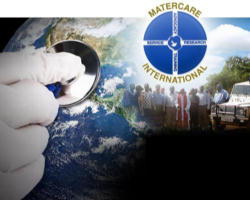MATERCARE INTERNATIONAL’S STATEMENT ON THE DECISION BY HEALTH CANADA TO APPROVE MEDICAL ABORTION PILL
August 26, 2015
Introduction
Canada’s minister of health recently announced approval of a method of medical (chemical) abortion which will be available to Canadians from 2016. The chemical cocktail contains 2 drugs, mifepristone (RU 486) and misopristol, which can terminate an early pregnancy without the need for surgery in most cases. Mifepristone poisons the baby by opposing the action of progesterone, a natural hormone produced by the ovary and which supports the baby during the 1st trimester of development. Misoprostol works by inducing contractions in the womb, resulting in the baby and it’s sac being expelled from the mother’s body.
This type of medical abortion has been legalised in dozens of countries around the world where it is used to procure 20-60% of abortions, the remainder of mothers undergoing surgical abortion. When used to abort pregnancies up to 49 days from the first day of the mother’s last period, the effectiveness of medical abortion is about 95% in 1 week. Up to 5% of women (1 in 20) go on to have surgery to complete the abortion (D & C).
Historically, the introduction of medical abortion has been justified with claims that, compared with early surgical abortion, it is simpler, cheaper, easier to access, safer, more convenient for rural women, can be administered at home and avoids hospitalisation, causes less psychological distress and is preferred by women. In addition, the Chief Executive of the Society of Obstetricians and Gynaecologists of Canada, has opined that the introduction of medical abortion should not result in more mothers opting for abortion. The current Canadian abortion rate of 100,000 per year is expected to remain stable.
However, an examination of the literature paints a different picture. Compared with early surgical abortion, medical abortion has been reported to cause severe side effects in 23% of women including nausea, vomiting, diarrhoea, abdominal pain, headaches, dizziness and fever. Medical abortion takes longer (up to 2 weeks instead of 2 days) and is less predictable, causing women to abort anywhere and at any time. More doctor and hospital visits are needed to deal with the side effects and the longer process of abortion. More time off work is therefore needed and women undergoing medical abortion have reported more emotional distress from seeing the foetal tissue they have passed. Furthermore, medical abortion cannot entirely replace surgical abortion. In particular women undergoing medical abortion require ready access to a hospital-based service to deal with complications such as an incomplete or failed abortion, and to control heavy bleeding.
Overall, the death rate from medical abortion is about 10 times that of early surgical abortion. This is due to 3 specific problems seen with medical abortion: catastrophic vaginal bleeding, severe overwhelming infection (e.g. with Clostridium sordelli) and the mis-diagnosis of ectopic pregnancy. Serious complications from medical abortion are seen more often in women under the age of 18 years
Medical abortion has the added complication that some women who, having commenced mifepristone (RU486), change their mind and withdraw from treatment. If not managed appropriately with progesterone support, there is a 23% chance of birth defects including sirenomelia (fusion of the lower limbs).
Medical abortion using mifepristone (RU 486) is potentially reversible was first described in the medical literature in 2007 and, as of April 2015, there have been 223 attempts which resulted in 127 pregnancies either continuing or ending in a live birth. Treatment involves administering Progesterone by IM injection or vaginal pessary to ‘neutralise’ mifepristone until it is cleared (metabolised) by the mother’s body. Doctors can register to treat women requesting reversal of a medical abortion, and women can access doctors to reverse their medical abortion on the website www.abortionpillreversal.com.
MaterCare International believes that medical abortion is intended for the mass killing of human babies during the first 3 months of their development and that making it readily available in Canada will have significant negative health consequences for Canadians. By encouraging irresponsible sexual behaviour, increased access to medical abortion is likely to increase the overall number of abortions and cases of sexually transmitted diseases (STD’s). More women will therefore suffer from the sequelae of STD, such as infertility and ectopic pregnancy, and the known complications of abortion. These include, post-abortion grief, anxiety, depression, substance abuse, suicide, preterm birth and breast cancer.
Some fathers and other family members will also suffer the psychological complications listed. Easier access to medical abortion also means a shorter ‘cooling off’ period for parents to reflect on alternatives to abortion. More parents will later regret hastily choosing abortion.
MaterCare believes that there is a paucity of knowledge of the potential reversibility of medical abortion among abortion providers, doctors in general and the lay (non-medical) public.
Proposal
MaterCare proposes a three-pronged approach:
1. To oppose generally the abortion and, in particular, the introduction of medical abortion in Canada.
2. To warn the Canadian public about the negative consequences of medical abortion.
3. To inform the Canadian public that once begun. a medical abortion may be reversed.
Process
1. MaterCare will inform the Canadian about the negative consequences of medical abortion, healthy alternatives and how it may be reversed.
Conclusion
MaterCare believes that medical abortion is intended for the mass killing of human babies during the first 3 months of their development and that making it readily available to Canadians will cause the death of millions of would-be citizens and impact negatively on the reproductive health of women and the mental health of families.
MaterCare intends to oppose the introduction of medical abortion and fully inform Canadians and the people elsewhere about important and little-known aspects of medical abortion- it’s negative consequences and how it can be reversed.
Author; Professor Bogdan Chazan MD, PhD,
Chairman of MaterCare International’s Council and of MaterCare Poland
Professor of Obstetrics and Gynecology,
Warszawa, Poland
e-mail: b.chazan@wp.pl
Tel mobile: +48 602 305 475.
Contact person: Professor Robert Walley Founder and Executive Director MaterCare
St John’s, Newfoundland, Canada
Email: info@matercare.org
Tel Office: + 1 (709) 579-647221









